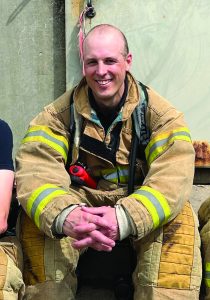Kyle Bode has been in the fire service for more than 20 years and he’s a proud MnFIRE peer supporter. Peer supporters like Kyle are a crucial support system for Minnesota’s 20,000 firefighters and their families. They provide free and confidential support to their fire service brothers and sisters experiencing personal, emotional or work-related problems.
We sat down with Kyle to hear more about his experience with MnFIRE Peer Support and how he shows up for fellow firefighters by offering a listening ear.
Tell us a little about yourself, your history with the fire service and who you are outside of your role as a firefighter.

I was recruited by Saint Paul Fire Department’s fire chief at the gym. I had completed active-duty military and I was going to college and working at the gym. I had no clue what I was going to do. It sounded interesting so I applied for the upcoming Saint Paul test. I really didn’t expect to get hired. I remember taking the written test with 3,500 people at the RiverCentre and feeling like I didn’t have a chance. I was hired in the first class off of that list. While I waited for the academy, I was hired as a volunteer for the White Bear Lake Fire Department, where I served for a little over a year. I also served as an Air Force Reserve firefighter for 16 years and retired from the military in 2022.
I live in Blaine with my wife and four kids, ages 4, 8, 12 and 13. Outside of the fire department, most of my time is spent with my family. My wife owns a dance studio, so that also keeps me busy. I enjoy physical challenges and have competed in many marathons, a couple of Ironman Triathlons and also some long-distance rucking events. I prioritize my physical health because it helps me a lot with my mental health.
Why did you become a MnFIRE peer supporter?
I spent several years struggling with my mental health and substance abuse. In 2022, I checked into a first responder treatment facility where I was treated for alcohol abuse and PTSD. I learned so much during that time including better ways to keep myself healthy both mentally and physically. It didn’t take me long to realize that I wasn’t alone. Once I was able to get myself in a healthier space, I realized many of my peers were having similar struggles. In my experience, it is tremendously helpful to be able to talk to another person who has gone through what you are going through, so I pursued becoming a MnFIRE peer supporter.
What is the most rewarding part of being a peer supporter?
I think just being there for another person, so they don’t feel like they are going through it alone. It’s also extremely rewarding to witness and be a part of someone’s journey to feeling better and finding a healthier place in their life.
What is the most surprising part of being a peer supporter?
Unfortunately, I think the most surprising part for me has been witnessing firsthand how many of my peers are struggling. There is a silver lining though, because I have been able to witness some pretty incredible change during that time.
What do you see as the most valuable component of the MnFIRE Hometown Heroes Assistance Program?
The program helps remove a lot of barriers. It makes it much easier for those who need help to get the help. I have sat with peers who have called the hotline and have gotten set up with a therapist, for free, that same day. MnFIRE has done the work and vetted the mental health professionals, so you get connected with the right person. I have used the HHAP and I find it very helpful.
What two suggestions would you share with every Minnesota firefighter to improve their mental health?
I think the most important thing that I would share is that it’s OK to ask for help. We all sign up to do this dangerous job, but the bravest individuals that I have seen are the ones who admit that they are not OK and need help. I also think it’s important to make diet and exercise a priority. I can’t stress enough how much it helps with our mental health. It’s the number-one medicine for our well-being, and it’s free!
Anything else you’d like to add?
In the span of eight years, I tragically lost two of my brothers from the Saint Paul Fire Department to suicide. This heart-wrenching experience underscores the urgent need for anyone grappling with their mental health to reach out for help. Remember, you are not alone. Your loved ones and those around you genuinely care and want to support you. Don’t hesitate to seek assistance.
See more stories like this in our 2024 Taking the Lead impact report.
Help is just a call away
MnFIRE Peer Support is a safe, confidential space to talk about what you’re going through with someone who gets it. Minnesota firefighters and their family members can get connected with a peer supporter by calling our 24-hour helpline at 888-784-6634.


